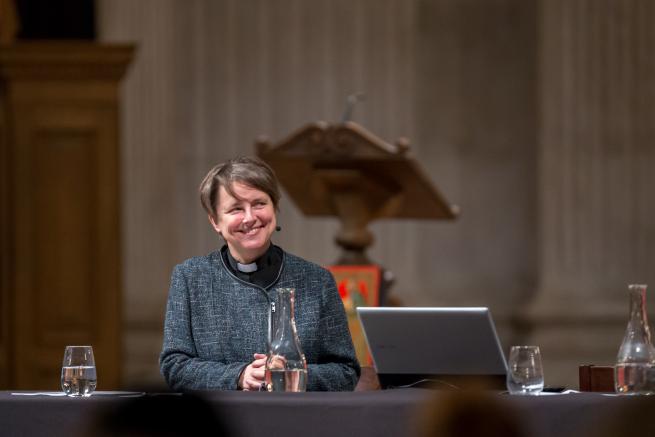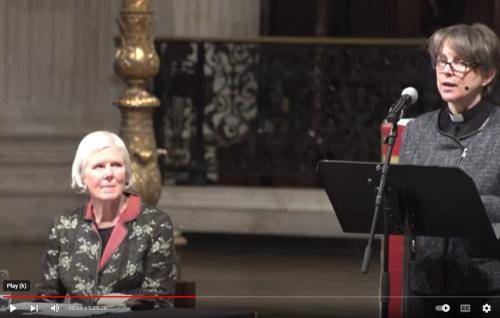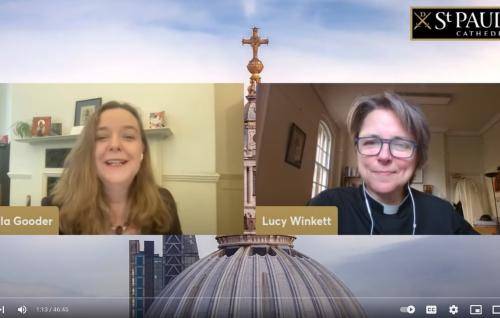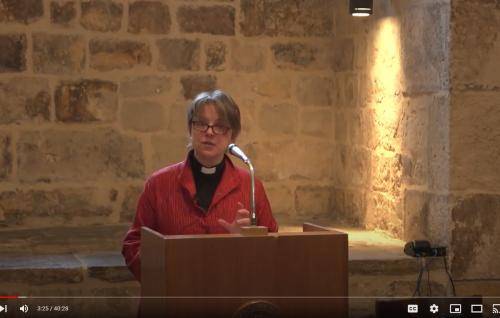We are Here: Holy Week
We are Here: Holy Week
Lucy Winkett’s reflections take us on a pilgrimage through each day of Holy Week from Monday to Good Friday.
MONDAY
The incomparable soprano Jessye Norman, who from time to time attended St Paul’s Cathedral, made a recording of spirituals released in 1986. Unaccompanied, she sings, amongst others, ‘Were you there when they crucified my Lord?’. And after the last verse, when she has drawn us into her world echoing with the sun’s refusal, the nails, the grave, she simply stops singing the lyrics, published in 1899 as one of the slave trade’s ‘Plantation hymns’, and starts only to hum the tune. I say ‘only’, but it is absolutely not a reduction.
The meaning of this lament, this call to the sky, is brought into sharp focus by the ending to the song that is wordless; a song not only of an individual Christian soul but of a whole people enslaved. And whenever I hear her move between the haunting tune and the repeated refrain of ‘tremble, tremble, tremble’, I am struck by the wordlessness of this week we call holy.
Christ remains silent before Pilate.
The woman who anoints him today simply weeps and touches him in preparation for the death that has come close, suddenly.
And there are sometimes days, situations, events, and reactions, that cause us to tremble, perhaps like this year’s circumstances. Tremble, lament, fall silent and pray.
Were you there?
We are here. And we tremble for our world, for ourselves, and like Jessye Norman’s spiritual, find both horror and beauty in the song.
TUESDAY
Unless a grain of wheat falls into the earth
Jesus of Nazareth was, amongst many other things, a poet, whose wordsmithing is still detectable even through the multiple cultural filters of Aramaic, Greek, King James’s English and today. One of his most poetic word-pictures is a falling grain of wheat. And it’s the saying traditionally read in churches on the Tuesday of Holy Week.
Unless a grain of wheat falls into the earth and dies, it remains just a single grain; but if it dies, it bears much fruit.
Travelling through Holy Week is demanding not only spiritually but psychologically as we, through the characters in the story, face our own hubris, our capacity for betrayal, and our competitive clinging to false securities that we think will make us safe. But in this gentle everyday event of wheat falling to the ground, we’re challenged to be truthful with ourselves about what fantasies we cling to about ourselves; us at our most spiritual or most successful.
What false securities are we asked to let go of, in order to be, in the creation imagery, fruitful, fertile, abundantly and interdependently ourselves as we are made to be?
Letting go of them feels like losing something essential. It will feel like falling. Not to put too fine a point on it, it will feel perilous, like dying.
But another poet can help us here. Theresa of Avila, no stranger to suffering, reminded us back in the 16th century that it is not possible to fall out of the eternal arms of God. We can only fall into them.
WEDNESDAY
Spy Wednesday: Betrayal and a kiss
I’ve always loved the name for this day: Spy Wednesday. It introduces a contemporary note into what can inevitably feel like a Holy Week story that is culturally far from 21st century UK. Spy Wednesday doesn’t, unlike other names of days this week, get its name from a Latin root. It describes what it says. That Judas, from today when he decided to take the thirty pieces of silver, became a spy in the closest circle of Jesus and tomorrow will betray him with a kiss.
After centuries of condemnation, in recent years, Judas has been receiving something of a rehabilitation theologically and in Christian spiritual reflection. I’m glad of this. Because today is a sort of ‘cusp’ moment that any of us might recognise in our own lives. It’s the kind of moment when you and I set in train a set of events that we know to be damaging, most certainly to others and probably to ourselves too. But, either because we’re angry and disappointed like Judas, or because we become enthralled to a pattern of behaviour or the influence of another person, we, like St Paul, don’t seem to be able to ‘help ourselves’.
This can be as simple has having that second glass of wine, or making that unneeded purchase online, or as complex as sabotaging a relationship or a job or living with an unexamined addiction. Fuelled by fury and disillusion, Judas just went with it. As we sometimes just go with it. And while we condemn Judas, we condemn ourselves. But Christ, harrowing hell on Saturday night, is asked why he is there. I have come to find my friend Judas, he says. And when he sees him, he embraces him with a kiss.
THURSDAY
Maundy Thursday: the beginning of a new way of living
Tonight begins Jesus’s last conversation, with us, and with God. It is a conversation with us that begins with his tying a towel around his waist and offering to wash our feet. Like Peter, we might say that this is ridiculous – how can we allow it? We should be the ones doing that. But once it has been explained to us, gently, again, we spring up with him and start to remove our clothes, hoping against hope that we will be washed, and renewed and given a better direction, a deeper purpose, by the touch of Christ at our feet.
The conversation with us continues through a chiding when we fall asleep too soon, to a final invitation, tomorrow. with Mary and John, to form new communities of love, however bruised or grief stricken we may feel at the events of life.
The conversation with God takes Jesus from an assurance that he’s on the right track, reinterpreting the ancient rituals with a new commandment to remember and to love, through to a begging for relief, a cry of abandonment and then the final repetition of the prayer he taught his friends not so long ago; thy will be done.
Conversations matter. Tonight, around the table in the upper room, conversation is heady, perhaps a little intense; for Jesus it is his last night. For one other, the guilt of what he sets in train tonight will mean it’s his last night too. For everyone else, for us, it’s the beginning of a new way of living.
Whatever our life is now, however long we have to live, we will love, and forgive, and be loved and forgiven, for ever and for ever.
FRIDAY
Good Friday
And so we’re here. The day of execution. Jesus has been afraid to die, and afraid to die alone. Today he will scream at God that God has abandoned him. And by speaking at all from the Cross, that most barbaric and showy forms of execution, he teaches us to speak from situations of suffering and dereliction. Even if it is to accuse God who seems so far away.
Today we draw close to Jesus who is, after such energetic and urgent ministry, rendered still, pinned, dis-abled by the irreducible human need to destroy what challenges our own power and control. Jesus’s life pointing to an upside-down kingdom where the poor, the ones who are secretly (or not so secretly) despised, become teachers and guides, proved in the end too threatening. And so he dies, alone.
The novelist Colm Toibin imagined, provocatively, that contrary to all the deposition paintings we have been familiar with over the years, Mary didn’t, couldn’t, stay to the end. In some ways a shocking suggestion. But maybe also too a faithful one?
Because some years, maybe this year, it’s hard to stay confronted with the pain. And so perhaps with her, we can allow ourselves quietly to slip away when it’s too hard. And if we do, the distance will remind us that God remains free from our need to be thought of as holy.
One last thing: the artist Mark Cazalet was commissioned by a convent in London to paint the Stations of the Cross. Together with the Mother Superior, he imagined what Mary would have done on the evening of Good Friday. She visited Judas’s mother. And so the final station is a picture of these two women, together at the end of a terrible day, finding solace in the company of one who understood.

About the author
The Revd Lucy Winkett is Rector of St James’s Piccadilly and former Precentor of St Paul’s Cathedral.







